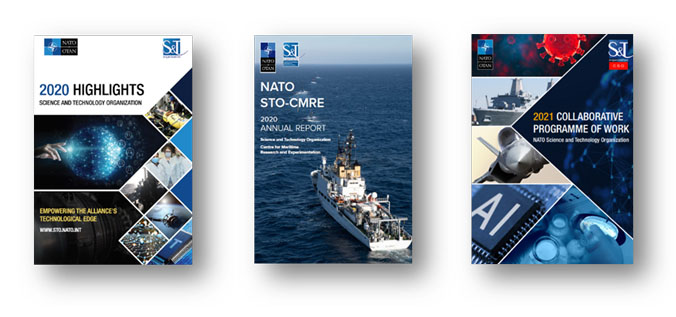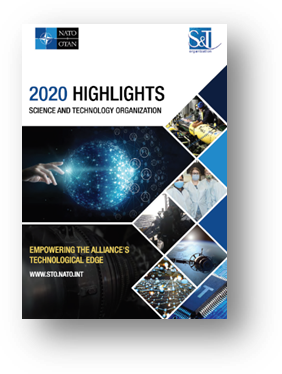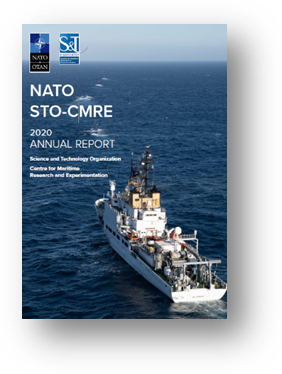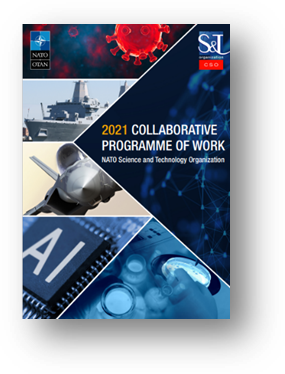
In his Annual Report, the NATO Secretary General spoke in his foreword of the “need to maintain our technological edge, to remain competitive in a more competitive world”. Three publications show how NATO researchers are pursuing this task.
Despite the pandemic that marked 2020 and will continue to challenge us in 2021, the NATO Science & Technology Organization (STO) and its network of over national 6,000 scientists, engineers and analysts delivered a tremendous programme of work (PoW). This programme demonstrates, once again, that the STO stays at the forefront of science & technology and remains committed to sustaining the Alliance’s technological advantage.
In March 2021, the STO issued three reports to introduce the general public to a selection of the impressive results achieved over the last year and to offer an overview of its future projects.
 The 2020 HIGHLIGHTS illustrates the military relevance and high scientific quality of work that is conducted within the STO framework, encompassing the Centre for Maritime Research and Experimentation (CMRE) and the Collaborative Programme of Work (CPoW). The STO currently has over 340 projects underway, ranging from major research programmes to lecture series, as well as cooperative demonstration of technologies. This report offers a select overview of some of the most representative projects and shows how the STO focused on its programme in 2020. As the COVID-19 pandemic rapidly become a priority, the experts’ network responded with imagination and speed to this new challenge to provide innovative solutions for virus detection, improved situational awareness, resilience and preparation for a post-COVID-19 future.
The 2020 HIGHLIGHTS illustrates the military relevance and high scientific quality of work that is conducted within the STO framework, encompassing the Centre for Maritime Research and Experimentation (CMRE) and the Collaborative Programme of Work (CPoW). The STO currently has over 340 projects underway, ranging from major research programmes to lecture series, as well as cooperative demonstration of technologies. This report offers a select overview of some of the most representative projects and shows how the STO focused on its programme in 2020. As the COVID-19 pandemic rapidly become a priority, the experts’ network responded with imagination and speed to this new challenge to provide innovative solutions for virus detection, improved situational awareness, resilience and preparation for a post-COVID-19 future.
The STO provided advice to NATO leadership in crucial fields such as analysing science & technology trends 2020-2040; dealing with misinformation; addressing climate change; underpinning data policy; supporting nuclear verification; and conducting the multi-national experiment on chemical, biological, radiological defence. Furthermore, conscious of the need to seek out new ideas and to maintain the experts’ network vibrant and diverse, the STO developed a number of initiatives to welcome and integrate early career scientists.
 The CMRE 2020 ANNUAL REPORT highlights the CMRE’s recent achievements in conducting scientific research and technology development, centered on the maritime domain, and delivering innovative and field-tested science & Technology solutions to address defence and security needs of the Alliance. Throughout 2020, the Centre demonstrated its resilience to the constraints imposed by the pandemic and continued to deliver its programmes on autonomous naval mine countermeasures; autonomy for anti-submarine warfare; data knowledge and operational effectiveness; environmental knowledge and operational effectiveness; and maritime unmanned systems enablers. Furthermore, the Centre applied its expertise to forecasting the evolution of the COVID-19 pandemic and intensified its young community outreach.
The CMRE 2020 ANNUAL REPORT highlights the CMRE’s recent achievements in conducting scientific research and technology development, centered on the maritime domain, and delivering innovative and field-tested science & Technology solutions to address defence and security needs of the Alliance. Throughout 2020, the Centre demonstrated its resilience to the constraints imposed by the pandemic and continued to deliver its programmes on autonomous naval mine countermeasures; autonomy for anti-submarine warfare; data knowledge and operational effectiveness; environmental knowledge and operational effectiveness; and maritime unmanned systems enablers. Furthermore, the Centre applied its expertise to forecasting the evolution of the COVID-19 pandemic and intensified its young community outreach.
 The 2021 COLLABORATIVE PROGRAMME OF WORK (CPoW) provides an overview of the STO projects planned for 2021 in defence and security-relevant research and technology development for enhanced operational military capabilities for the Nations and NATO. These will be conducted across all topical areas of the CPoW: Applied Vehicle Technology (AVT); Human Factors and Medicine (HFM); Information Systems Technology (IST); Systems Analysis and Studies (SAS); Systems Concepts and Integration (SCI); Sensors and Electronics Technology (SET); as well as Modelling and Simulation (NMSG). For 2021, many CPoW projects are focused on the applications as well as implications of emerging and disruptive technologies: space; data; artificial intelligence; autonomy; biotechnology; hypersonics; quantum; novel materials.
The 2021 COLLABORATIVE PROGRAMME OF WORK (CPoW) provides an overview of the STO projects planned for 2021 in defence and security-relevant research and technology development for enhanced operational military capabilities for the Nations and NATO. These will be conducted across all topical areas of the CPoW: Applied Vehicle Technology (AVT); Human Factors and Medicine (HFM); Information Systems Technology (IST); Systems Analysis and Studies (SAS); Systems Concepts and Integration (SCI); Sensors and Electronics Technology (SET); as well as Modelling and Simulation (NMSG). For 2021, many CPoW projects are focused on the applications as well as implications of emerging and disruptive technologies: space; data; artificial intelligence; autonomy; biotechnology; hypersonics; quantum; novel materials.
As the NATO Chief Scientist, Dr Bryan Wells highlighted: “Supporting National and NATO priorities on delivering innovation for the Alliance has been a particular focus of the work of the STO in 2020”.
While the threats that existed before the pandemic have not diminished, the STO remains committed to supporting, advising and preparing Nations and NATO for the emerging technological environment and future challenges.
